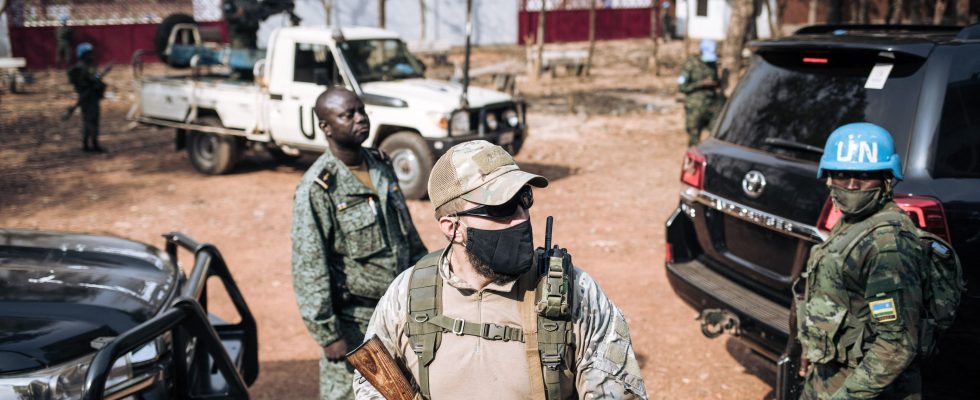Before boarding his private jet in the early evening of August 23, Yevgeny Prigozhin should have asked himself why, at the same time, a delegation from the Russian Defense Ministry landed in Libya, thousands of kilometers away. Led by Deputy Minister Younous-Bek Evkourov, the laced Areopagus met the warlord of Eastern Libya, Khalifa Haftar. The reason for this visit, revealed by THE Wall Street Journal ? Inform the latter, under contract with the Wagner group since 2018, that Russian military intelligence officers would now be stationed on site and that a new private militia would soon replace Wagner… The crash of Prigojine’s plane and his entire team n It was definitely not a coincidence. Their days had long been numbered.
After the announcement of the death of a good part of Wagner’s staff, the visits of Russian officials continued to follow one another. In Syria, Burkina Faso, the Central African Republic and Mali, the delegation met customers of the Wagner group, notes the investigative collective All Eyes On Wagner. The subject of discussions: ensuring the transition, because the Russian state has every interest in continuing Wagner’s activities on this continent. Present in around ten countries, the organization has considerably extended Moscow’s geopolitical influence there. But how to proceed? Should the organization be disbanded and replaced? Absorb it? Two options are on the table.
Deploy new militias
Two private military companies, among the twenty that unofficially exist in Russia, have already positioned themselves to take over Wagner’s activities. The first, Convoy, began to make itself known on social networks from November 2022. It is supported by Sergei Aksionov, “head of the Republic” of annexed Crimea, where the militia has set up its training bases. Its management is ensured by Prigojine’s former right-hand man, Konstantin Pikalov, nicknamed “Mazaï”, who notably carried out influence operations in Madagascar. The Dossier Center investigation cell, financed by the former Russian oligarch in exile Mikhail Khodorkovsky, found that a month and a half after the Prigozhin mutiny, last June, Convoy had received more than 400 million rubles in “charitable donations” (nearly 4 million euros), more than half of which came from close oligarchs of power, such as Arkadi Rotenberg, who owns subsidiaries of Gazprom and the state bank VTB. By early summer, Convoy had 400 soldiers.
Another militia, Redut, would also be in the running. Linked to oligarch Gennady Timchenko and the Russian group Gazprom, this military organization was created in 2008 by the merger of several small groups of veterans of the foreign intelligence service, the air force and ministry units. of the defense. Redut has been deployed in Ukraine since the Russian invasion in 2022 and reportedly has 7,000 soldiers, after the integration of smaller units, such as Potok and Fakel.
It is still impossible to know where precisely these militias are established on the African continent. “Short term, [faute de moyens et d’expérience,] they will not be able to replace Wagner”, precise nevertheless independent journalist and researcher John Lechner, in an article for the online media openDemocracy.
Let Russian military intelligence take over
But these two SMPs which we could consider as “Wagner babies” will certainly be much less autonomous than their elder sister. They are in fact both linked to the GRU, the Russian military intelligence agency, under the authority of the Ministry of Defense, a unit of which was revealed to be at the origin of clandestine operations abroad, such as the poisoning of former officer Sergei Skripal in the United Kingdom in 2018.
Because Wagner was only one of Russia’s instruments to get its hands on Africa. According to Wall Street Journal, the GRU allegedly began, even before Prigozhin’s death, to try to take control of the Wagner Group’s units in Africa. Its leader, General Andreï Averianov, was also present in Sochi in July, during the Russia-Africa summit, and attended meetings with the Malian, Burkinabe and Eritrean delegations, according to All Eyes On Wagner. “Influence and disinformation [en Afrique] would fit perfectly into the GRU’s missions”, note the American Kimberley Marten, Wagner specialist, in an article for the Russia Matters site. Several Wagner veterans have also reportedly signed contracts with the Ministry of Defense.
A big unknown remains: what will become of Wagner’s economic activities in Africa, which consisted of ensuring the predation of resources (notably mining), thanks to a complex network of companies linked to Prigojine? Since 2018, the Wagner empire has reportedly collected more than 250 million dollars (230 million euros). For Kimberley Marten, “it is likely that a new semi-state version of the Wagner Group will continue to operate [sur le continent africain]”. Which will always be harder to track down for the international community.
